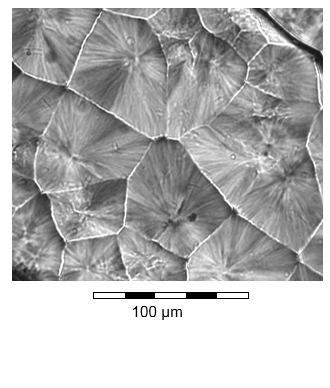Topic of the thesis:
The goal of your work is to determine local degrees of crystallization in polyamides to describe diffusion processes within the material.
During their use, plastic components come into contact with various liquid environments, which can significantly alter the properties of the components. For polyamides, exposure to water, for example, leads to a significant decrease in stiffness depending on the water content. To understand these changes, a detailed knowledge of diffusion processes within the material is necessary. One crucial factor influencing diffusion within polyamides is the local degree of crystallization. Diffusion mainly occurs in the amorphous regions of the material, while no diffusion is assumed to take place in the crystalline regions. Therefore, precise knowledge of the local degrees of crystallization is crucial for describing diffusion. This poses a particular challenge for plastics due to the locally varying layer composition caused by their low thermal conductivity. This is where your work comes in.
Work within this research group:
The work will be carried out within our research group, which focuses on the molecular dynamics of polymers and the investigation of media-induced aging processes of plastics. Within these two research areas, various research questions arise. We conduct studies on plastic recycling and the development of recycling loops. Additionally, we investigate failure causes and their development in plastics to increase the durability of products during manufacturing and contribute to a more sustainable use of finite resources.
Objective:
The aim of your work is to experimentally determine local degrees of crystallization in polyamide 6.6 using different experimental techniques. This includes experiments using differential scanning calorimetry (DSC) to determine crystallization and transfer the data to local crystallization states. The exact content and scope of your work will be determined together, depending on the type of work and your personal interests. The following list provides a rough overview of possible areas of focus, and the task can be individually tailored to your interests.
For a bachelor's thesis, you will work on the following:
- DSC measurements to determine the degree of crystallization on unprocessed material
- DSC measurements on samples directly taken from a component
- Development of a method to transfer measurement data to local degrees of crystallization
For a master's thesis, you will work on the following:
- DSC measurements to determine the degree of crystallization on unprocessed material
- DSC measurements on samples directly taken from a component
- Development of a method to transfer measurement data to local degrees of crystallization
- Concept development and implementation of alternative methods for DSC measurements enabling the determination of crystallization
If you are interested in simulation work, an implementation of the developed approach into an injection molding simulation and subsequent diffusion simulation can also be conducted.
Your profile:
- Technical or scientific studies (mechanical engineering, materials science, chemistry, physics, or similar fields)
- Interest in independent and flexible work in a motivated team
- Interest in experimental work
If you are interested in a thesis at IKV and in this topic, please contact me or feel free to drop by for a coffee. The specific content and timeline will be individually discussed.
Your contact person:
Felix Melzer, M.Sc.
Phone: +49 241 80-28373
Email: felix.melzer@ikv.rwth-aachen.de

